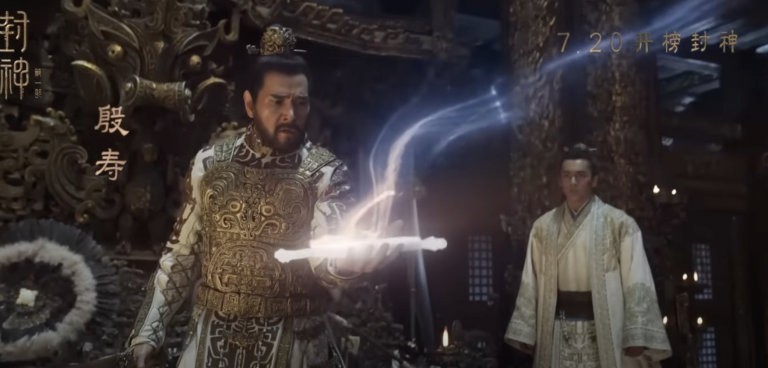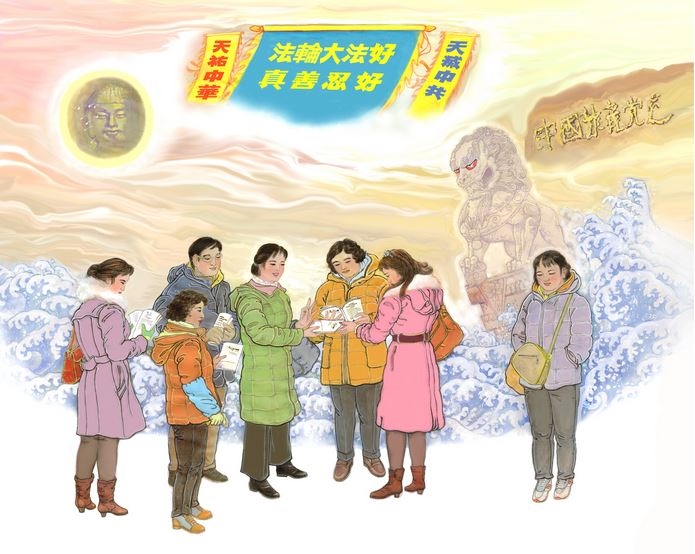In a testament to the enduring legacy of traditional Chinese myths and legends, the first part of a new film trilogy adapting the ancient classic novel Creation of the Gods (封神演義, also translated as Investiture of the Gods) premiered in China on July 20.
Titled Creation of the Gods I: Kingdom of Storms, the film is a production by ethnic Mongolian director Wuershan, who set out in 2018 on a journey into the intricate world of the Ming Dynasty classic.
So far, Kingdom of Storms has garnered a score of 7.7 out of 10 on Douban (a popular Chinese online database and social networking site), with the film captivating audiences drawn to the high-end retelling of the saga depicting a Trojan War-like conflict among both human and divine heroes in the early days of feudal China.
Bringing an ancient epic to life
Called the “most ambitious and expensive production in Chinese history,” Wuershan’s trilogy aims to bring to the big screen a story intertwining the exploits of men, gods, ghosts, and demons. The first part reveals the early threads of the classic, which is set at the end of the China’s Shang Dynasty (~1600–1046 B.C.) and depicts the rise of the Zhou kingdom (1046–256 B.C.).
Though originally slated to release in 2020, the novel coronavirus pandemic, including China’s “zero-COVID” lockdowns, delayed the film significantly.
Success
You are now signed up for our newsletter
Success
Check your email to complete sign up
At the heart of Kingdom of Storms is Yinshou, the final king of the Shang. A prideful ruler who offends the gods, Yinshou is led astray by the manipulations of the millenium-old nine-tailed fox, a bewitching spirit that possesses the princess Su Daji. His reign, increasingly marred by corruption and injustice, begets divine retribution and upheaval — setting the stage for the narrative that unfurls throughout the trilogy.
Standing against the oppression of Shang is the venerable Jiang Ziya, an immortal from the mystical Kunlun Mountains and disciple of the Primeval Lord of Heaven himself. As Yinshou descends into waste and corruption, Jiang Ziya embarks on a tumultuous search for a righteous leader worthy enough to end the tyranny, liberate the people from the oppressive rule of Shang.
Meanwhile, Jiang himself undertakes the mission given to him by the heavenly lord: casting titles upon the host of divinities who partake in the epochal conflict — the Creation of the Gods.
Wuershan’s adaptation features veteran Chinese actors such as Fei Xiang, Li Xuejian, Huang Bo, and Chen Kun to portray the classic tale’s timeless characters using modern filmmaking techniques, equipment, and technology.
RELATED: The Virtuous King Wen: Forging a Legacy for the Ages in an Era of Corruption
The journey to the big screen
Bringing the vast and intricate narrative to the screen was no small feat. The journey to the making of the series began nearly a decade ago, in 2014, when director Wuershan and his team first embarked on the scriptwriting process. Understanding the magnitude of the project at hand, they sought to deliver a script that could do justice to the mythic nature of the original text.
As such, Wuershan called upon scholars and experts from various fields — including anthropology, history, and folklore — to contribute their insights and expertise. This collaboration enriched the development process, ensuring that the script was well-informed and deeply rooted in the cultural context of the original story, he said.

In a group interview, Wuershan shared his thoughts on the monumental task of adapting such a complex and long story for the big screen. He emphasized the cultural importance of the fable, stating, “The story of Investiture of the Gods is, in essence, a national myth. It belongs to the collective mythology inherited by the Chinese nation for 3,000 years.”
The sense of reverence for the source material is evident in the film, critics noted — with the unique characteristics and complexities of iconic figures like Su Daji, Nezha, and Yang Jian being “preserved and presented with care,” according to Wuershan, who previously gained recognition for his 2012 adaption of another ancient tale, Painted Skin.
Wuershan was also inspired by the scale and cinematography of the Lord of the Rings trilogy, which was released in the early 2000s.
Depicting King Yinshou and Ji Chang — the upright regional lord selected by Jiang Ziya to lead the rebellion against the Shang — are cinematic heavyweights Fei Xiang and Li Xuejian. Though both in their 60s, the actors are known for their exceptional physical fitness.
Daji, the depraved but bewitching fox sprite who embodies the archetypal femme fatale in East Asian lore, is portrayed by Russian model Narana Erdyneeva. Known in China by her stage name Naran, the 25-year-old is of Russian and Mongolian extraction and hails from the Siberian region of Buryatia, lending an exotic flair to the iconic role.
Traditional pull, political redactions
Kingdom of Storms had a respectable box-office opening, selling 79 million yuan (around US$11.05 million) worth of cinema tickets on its premier night. As of July 26, the 3-billion-yuan production has made 600 million yuan, on track to meet — and possibly exceed — its currently expected earnings of 1.5 billion yuan.
READ MORE: The Plight of Falun Gong: 24 Years of Persecution in China and Beyond
The warm reception to Wuershan’s adaption of a well-known ancient classic fits with the growing popularity of traditional themes in China, ranging from dramas set in ancient times to rising interest in classical Chinese dress, dance, and music.
A review on Douban praised the “sincere, solid, and watchable” film, while noting that the director’s occasional addition of “personal expressions and romanticized depictions” did not detract from the overall work, which could stand as a good “representation of a Chinese mythological tale for the global audience.”
“It didn’t butcher the original,” a shorter reaction reads. Giving the film 4 out of 5 stars, the reviewer praised Kingdom of Storms for its “extremely lucid” transfer of the plot to the big screen, while noting that even three films would be insufficient to fully adapt the 100 chapters of the original novel.
Building on the sentiment, a longer appraisal conceded the difficulty of Wuershan’s undertaking, while suggesting that the film could have benefited from focusing on one of the several main characters.
Shi Tao, a popular overseas Chinese commentator, weighed in on the changes Kingdom of Storms made to the plot of the original novel, noting that the script had taken several years to gain approval from the Chinese Communist Party (CCP) censors.
Significantly, much of the mythological nature of the epic had been scaled back or removed, refocusing the story on the struggle between the Shang royal house and that of the up-and-coming Zhou Dynasty, Shi Tao said.
“Just one immortal — Jiang Ziya” — is left as the main mystical personality in the film version, Shi Tao observed. “For example, Huang Feihu, who manages the 18 layers of hell, was cut out entirely. He is the first god [in the original work] to receive a title.”
“Everyone knows that [Creation of the Gods] is supposed to be a story about gods, but they made [Kingdom of Storms] revolve around human beings,” he said.
Shi Tao also noted that in his statements and interviews, Wuershan avoided the religious-sounding words “god,” “Buddha,” or “Dao,” instead preferring “immortals” and “demons.”
“I suspect that had he used those words, the film would not had made it past the censors,” Shi Tao said.
Leo Timm contributed to this report.















